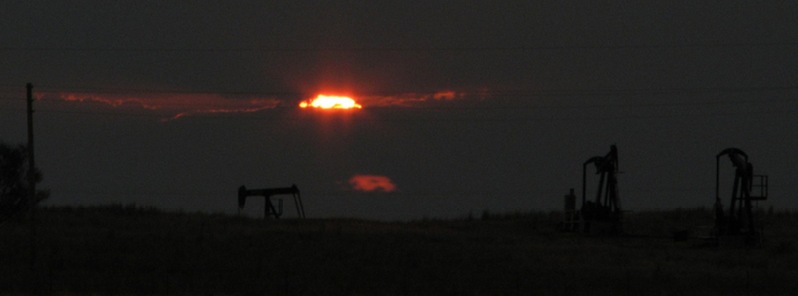Fracking plays active role in generating toxic metal wastewater

A new study has been conducted to investigate the toxic barium metal in fracking wastewater. Although the chemicals inserted into injected freshwater during the mixing process with highly saline brine in the rock are generally assumed to be partially responsible for the production of toxic metal wastewater in hydraulic fracturing, new results indicate the chemical reactions between injected freshwater and the fractured shale are of high impact.
Fracking water poses a high risk hazard to drinking water supplies if disposed without proper precautions. Despite the fact that the process of hydraulic fracturing represents an important technological advance in extracting natural gas and petroleum from black shales, the emerging wastewater is highly saline and contains high concentrations of barium.
So far, it was thought that the compositions of the wastewater is due to its mixing with highly saline, barium enriched underground water. However, the scientists from Dartmouth College have discovered a large amount of barium tied to clay minerals, and it is released into the injected water as it becomes more saline over time.
New research shows that transformation of freshwater in the fracking process, taking place 1.6 km (1 mile) below the Earth's surface, could be a natural consequence of an interaction between water and rock under the conditions of elevated temperature and pressure, in the absence of oxygen.
The large gas reserves, widely exploited in the fracturing process in the last few years, are located in the Marcellus Shale, Pennsylvannia, and the experts have studied samples from three drill cores from this area and from New York in order to explore interactions between water and rock responsible for releasing barium and other toxic metals during hydraulic fracturing.
"Based on barium yields determined from laboratory leaching experiments of the Marcellus Shale and a reasonable estimate of the water/rock mass ratio during hydraulic fracturing, we suggest that all of the barium in produced water can be reconciled with leaching directly from the fractured rock," said Mukul Sharma, a professor of Earth Sciences at Dartmouth College and a senior author of the research paper.
"Importantly, barium behavior allows us to understand the behavior of radium, which is very abundant in produced water and is a very real environmental concern. There has been much discussion about the injection of water with lots of toxic compounds during fracking. What is less known is that produced water is hazardous waste and chemical reactions between water and the rock are likely playing a role in its formation, not simply a mixing of freshwater with natural brines in the rock."
Reference:
- "Reductive weathering of black shale and release of barium during hydraulic fracturing" – Devon Renock, Joshua D. Landis, Mukul Sharma – Applied Geochemistry (2015) – doi:10.1016/j.apgeochem.2015.11.001
Featured image: Oklahoma oil field by Jonathan C. Wheeler (CC – Flickr)

Commenting rules and guidelines
We value the thoughts and opinions of our readers and welcome healthy discussions on our website. In order to maintain a respectful and positive community, we ask that all commenters follow these rules:
We reserve the right to remove any comments that violate these rules. By commenting on our website, you agree to abide by these guidelines. Thank you for helping to create a positive and welcoming environment for all.